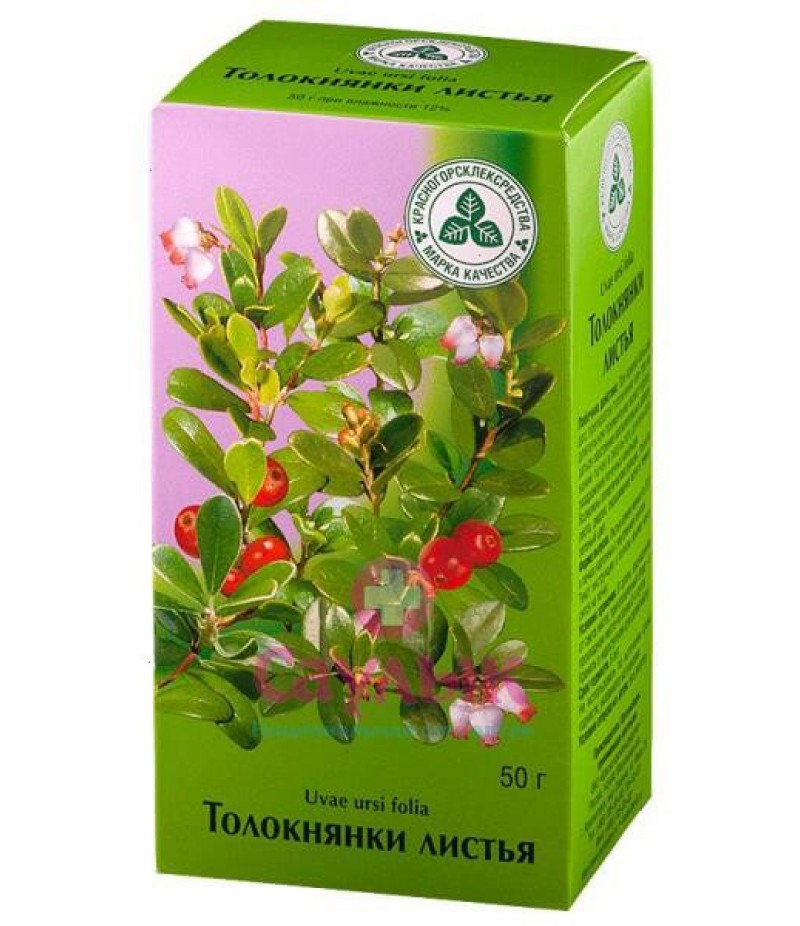Bearberry leaves (Uvae ursi folia) 50gr
- $5.20
- 3 or more $4.99
- Availability:In Stock
Bearberry leaves user manualReed more and buy Bearberry leaves on this pageCompositionEach filter bag contains 1.5 grams of herbal raw material of bearberry leaves in powder form.The leaves of the plant contain 8-25% of erycoline ..
Bearberry leaves user manual
Reed more and buy Bearberry leaves on this page
Composition
Each filter bag contains 1.5 grams of herbal raw material of bearberry leaves in powder form.
The leaves of the plant contain 8-25% of erycoline (arbutin glycoside), about 30% of the tannins of the pyrogallic group, flavonoids (isoquercitrin, quercetin, hyperoside, quercitin, myricitrin and myricetin), ursolic acid, free hydroquinone, essential oils and a number of acids (ascorbic, formic, cinchona). The leaves contain a fairly large amount of iodine, essential amino acids and nitrogenous substances.
Form of issue
The powder is packed in special filter bags. In a pack of cardboard is 10, 20 bags and instructions from the pharmaceutical company. The package shows a photo of a bearberry.
pharmachologic effect
Leaves bearberry ordinary contain a number of organic acids and a set of flavonoids, but the main therapeutic effect is provided by the glucoside contained in the plant arbutin. After entering the human body, arbutin as a result of hydrolysis breaks down into hydroquinone (diatomic phenol) and glucose. Hydroquinone has an antiseptic effect and has a diuretic, diuretic effect.
The most active process for the splitting of arbutin is observed in the urinary tract (alkaline hydrolysis, contact with uric acid), therefore the main properties of bearberry leaves find application in the therapy of nephrologic pathology (pyelitis, nephritis, urethritis, cystitis and other inflammatory processes in the bladder or renal system) . The medicinal properties of bearberry leaves have found application in diseases of other organs and systems (gastritis, goiter, etc.).
The broth of bearberry contains tannic substances, which in the digestive tract exhibit astringent action. Experiments in rats have shown that the plant is also an antihypoxant (the percentage of survival among animals has increased in hypoxic conditions).
Hydroquinone is able to increase the activity of oxidation-reduction processes. Under its influence, O-methyltransferase is blocked, which allows to prolong the action of adrenaline. Experimental studies have shown that hydroquinone has a positive effect on metabolism, the ability of the tissue to absorb oxygen, normalizes the level of glutathione, potassium and glucose in the blood, neutralizes diabetic ketoacidosis, and in a number of shock states shows a hypertensive effect.
Pharmacodynamics and pharmacokinetics
The manufacturer does not provide information on this section.
Indication, application of bearberry ordinary
The medicinal plant is used in the treatment of urinary tract diseases, renal system:
cystitis;
urolithiasis disease;
pyelonephritis.
Contraindications
Broth of bearberry leaves is not used in the following conditions:
bearing pregnancy;
allergic responses with individual hypersensitivity;
breast-feeding;
restriction on age - before reaching 12 years.
Side effects
Bearberry leaves with prolonged use can induce dyspeptic reactions:
vomiting, vomiting;
nausea;
diarrheal syndrome.
Perhaps an exacerbation of the inflammatory process in the urinary tract.
Leaves of bearberry, instructions for use (Method and dosage)
The medicinal plant is used in medicine in the form of a decoction or infusion inside 40 minutes after eating. Depending on the severity of the underlying disease, 45-75 ml per day is prescribed. The duration of therapy is 20-25 days. The course can be repeated after 10 days. In a year it is possible to pass no more than 4 courses. The broth and the infusion before ingestion should be carefully shaken. The prepared solution can be stored for 2 days in a cool place.
Preparation of the decoction: 1 filter bag is placed in a special dish (glass, enameled), poured boiled hot water in a volume of 200 ml and cover with a lid. For 30 minutes, keep in a water-boiling bath. After cooling, the solution is filtered, the vegetable raw material is squeezed. Boiled water volume of the resulting solution is adjusted to 200 ml. The infusion is prepared in a similar way, only the heating is carried out for 15 minutes, and the cooling before spin and filtration is 45 minutes.
Overdose
The manufacturer does not provide data for the specified section.
Interaction
It is not recommended simultaneous therapy with medicines that are able to acidify urine.
Terms of sale
You can buy Bearberry leaves without a prescription.
Storage conditions
Vegetable raw materials should be stored in their original packaging in a dry place. Sunlight can reduce the effectiveness of the medication. The prepared solution should be stored in a cool place.
Shelf life
Filter packets remain effective for 5 years. Ready infusion / decoction can be stored for 2 days.
special instructions
During treatment, temporary staining of urine in a dark, green color is possible.
Children
In pediatric practice, bearberry leaves can be used after reaching 12 years of age. For children, the infusion is prepared in a ratio of 3 g / 100 ml.
In pregnancy and lactation
Breastfeeding and bearing pregnancy are absolute contraindications.
Reviews of Bearberry Leaves
Infusion and decoction allows you to quickly stop the unpleasant symptoms that accompany most of the urinary tract diseases: itching and pain when urinating, discomfort in the lumbar region. Patients noted a significant improvement in overall well-being after the first administration of the solution. Rarely are there reviews about allergic responses in predisposed patients. Bearberry leaves are a good addition to the main therapy of urinary tract diseases.

